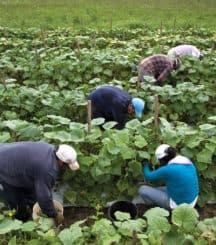
For many Latinos, as for other people of color, climate change is a daily lived experience.
Whether they live in Central, North, or South America, their lives are touched in some way by climate change.
“Part of the reason my family migrated [from Mexico] was due to a lack of resources … Some of us have been pushed out of our countries and we are seeing [climate change] in other parts of the world,” explained environmental justice advocate and organizer Erica Fernandez Zamora.
Bread for the World Institute published From Hunger to Hunger: Undocumented Immigrants Face Hunger on Both Sides of the Border as part of its work on immigration. Forced to leave their countries of origin because of hunger and deep poverty, many migrants continue to struggle with hunger when they reach the United States. Few jobs that pay a livable wage are available for people who may have little education, may speak little or no English, and/or may not have the legal right to work in this country.
Their personal experiences are one reason so many Latinos are leading the way in climate change advocacy. Climate change puts the safety and livelihoods of large numbers of people at risk, and Latinos are acutely aware of this. A study done by Yale University found that Latinos in the United States are more likely than the rest of the U.S. population to report experiencing impacts of climate change.
Texas, California, Florida, and Puerto Rico have some of the largest concentrations of Latinos in the United States, and all have been struck in recent years by devastating environmental disasters—hurricanes, wildfires, extreme heat, and drought. In the United States, 80 percent of all farmworkers are Latino, and Latinos make up nearly 7 percent of the nation’s natural resource laborers. Food production is highly sensitive to changes in the environment, including extreme heat and rainfall totals that are heavier than usual. This means that the livelihoods of Latinos are more likely to be at risk from climate change than those of other workers. A 2015 drought in California—relatively minor compared to some later droughts—nevertheless cost the jobs of 10,000 farm workers.
…the livelihoods of Latinos are more likely to be at risk from climate change than those of other workers.
Latinos are taking the initiative to be part of the solution as well. At both the local and national levels, organizations such as GreenLatinos and the Latino Community Foundation are advocating for much-needed action around climate. Their focus issues range from carbon pricing to conservation to farmworker rights.
It is important for people of color to be at the table for climate advocacy. The faces of climate leadership are disproportionately white, even though people of color are more likely to be adversely affected and are doing a great deal of advocacy work on the ground. Here is how Fernandez Zamora describes her efforts to ensure that the perspectives of people of color are well represented: “I think one of the opportunities that being a Latina gives me is the ability to see [climate change] from a different perspective, because of our experiences. When we go into climate spaces, we bring our people with us. I work hard to make sure my community has a voice and I bring it to the table.”
As the Latino population, including the number of citizens with voting rights, continues to grow, Latinos are poised to become a strong voting and advocacy base for climate and other issues. “We are growing in numbers, there are a lot of us, and we can impact policy,” said Fernandez Zamora.
For more on climate change and hunger, see the climate change section of Bread for the World’s 2019 Hunger Report, Back to Basics: How to End Hunger by 2030.
Karyn Bigelow is a research associate with Bread for the World Institute. This article first appeared on Bread for the World and is reprinted here with permission.


